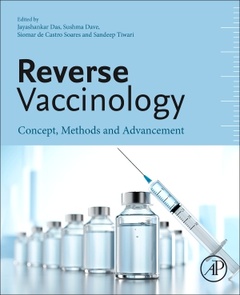Description
Reverse Vaccinology
Concept, Methods and Advancement
Coordinators: Das Jayashankar, Dave Sushma, Soares Siomar de Castro, Tiwari Sandeep
Language: English
Subjects for Reverse Vaccinology:
600 p. · 19x23.3 cm · Paperback
Description
/li>Contents
/li>Biography
/li>Comment
/li>
The book's final section, Disease Case Study, discusses real-world examples in the development of new vaccines for diverse diseases. It is a valuable resource for bioinformaticians, researchers, students, and member of the biomedical and medical fields who want to learn more about a new and agile process for the development of new vaccines.
1. Fundamentals of Reverse Vaccinology: History and advantage over the discovery of conventional vaccine candidate
2. Vaccine Antigen Discovery: Breakthrough in genomics era
Cemal Un, Ecem Su Kockaya, Hüseyin Can
3. Development of Subunit Vaccine: A step forward towards cost effective technology of vaccine candidate discovery
Babar Jamal
Section 2: Tools and Methods
4. Fundamentals of Machine Learning Approach for Vaccine Development
Dhanalakshmi Menamadathil
5. Immunoinformatic: An interdisciplinary technique for designing and engineering vaccine antigen
Tara Chand Yadav
6. Proteomics for Epitope-vaccine Design
Thiago Castro
7. Data bases and Web Servers for Conducting Reverse Vaccinology
Rommel Ramos
8. Bacterial Dynamics and Network Analysis for Antigen Screening
Flavia Figueira Aburjaile
9. Tools and Platform for Allergenicity Prediction
Georrge John J
10. Screening of Potential Vaccine Candidate Through Machine Learning Approach
Amjad Ali
11. Reverse Vaccinology 2.0
Georrge John J
12. Structural Vaccinology Approaches to Enhance Efficacy, Stability and Delivery of Protective Antigens
Tara Chand Yadav
13. NGS Driven Antigen Screening Technology in Vaccine Development
Medha Pandya
Section 3: Disease Case Study
14. Bioinformatics Approach Design of Peptide Vaccine for Viruses
Flavia Figueira Aburjaile
15. Confirmation of Candidates Identified by RV in Animal Models or Other Immunogenicity Assays
Helioswilton Sales-Campos
16. Clinical Trials of Vaccines Incorporating Antigens Identified From an RV Approach
Marcos Silva
17. Review on the Development of the Meningococcal Vaccine, Bacterial Vaccines (Streptococcus, Staphylococcus) using Reverse Vaccinology
Silvana Marchioro
Dr. Das received his PhD in Biotechnology and served as a Scientist at IBSD, DBT, and Government of India. He is founder and CEO of Valnizen which deals with regulatory documents and healthcare compliances and support services to African and southeast Asian countries. He has served as Joint Director to Gujarat State Biotechnology Mission, DST, and Joint Director to Gujarat Biotechnology Research Centre, DST, both from Government of Gujarat. He has served as Director, Savli Technology Business Incubator, DST, Government of Gujarat, India. He was actively involved in development and implementation of various policies and action plans like Biotechnology policy, Innovation policy, Interpole disaster management policy, start-up policy for many Universities and Government. His research team is involved in addressing societal challenges via cutting-edge research viz. development of molecular diagnostics for infectious diseases, development of universal vaccine candidate for emerging diseases, development of miRNA based targeted therapeutics, and artificial intelligence in healthcare applications.
Dr. Sushma Dave received Master of Science and PHD in Analytical, Electrochemistry and Environmental Chemistry from Biosensor Lab in Chemistry Department of Jai Narayan Vyas University, Jodhpur. She is involved continuously in the field of higher education teaching pure, applied chemistry, cheminformatics, nanotechnology, electrochemistry, biology, solid waste management, wastewater treatment and environmental chemistry to students of Engineering and basic sciences. She also served as Research Associate in Soil Biochemistry and Microbiology Division CAZRI, Jodhpur. She has published and presented over 50 papers in international and national journals, conferences and participated in various workshops and training programs. Her areas of interest are electrochemistry, biosensors environmental science, nanotechnology, biochemistry, cheminformatics, immunoinformatics, an
- Explains the fundamentals of reverse vaccinology and how it can save time in the development of new vaccines
- Focuses on efforts to develop a vaccine candidate against various pathogens using computational approaches
- Presents databases and web servers for conducting reverse vaccinology
- Describes the screening process of potential vaccine candidates through machine learning
These books may interest you

Modern Vaccinology 232.09 €



